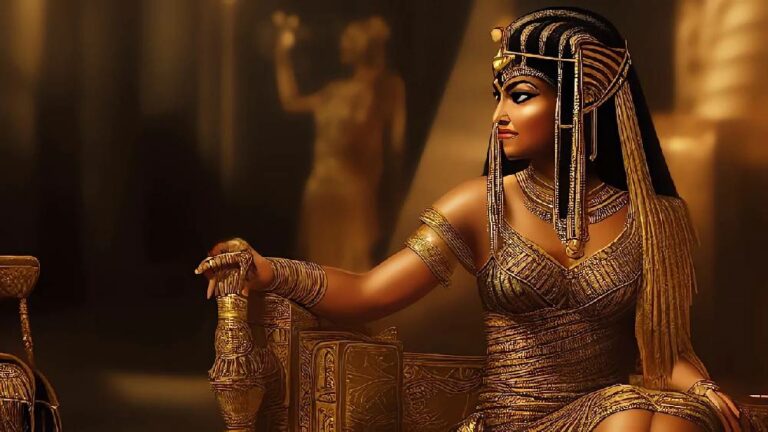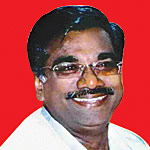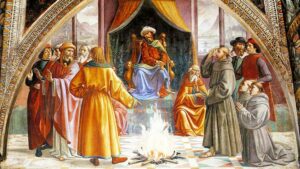Cleopatra was just a name to me when I heard of her for the first time in my life. That was when I was not yet a teenager and I heard of her name when my father abused my mother by saying, “Oh, you think you are Cleopatra, eh!” I do not remember in what context he did so, but the image of my mother heckling at my father is still green in my memory. The name somehow managed to go deep into my consciousness and I was surprised to note that it got stuck up there.
I remember to have asked my mother many times, as I was eager to know the meaning of the word. Every time I asked her, I received the stereotyped reply: “She is a woman”. I had no guts to ask my father for who can incur the wrath of a man by repeating his words uttered in anger! I conveniently forgot all about it.
I heard of Cleopatra again when I reached the Matriculation class. In a history class, I learnt that she was thirty-nine at the time of her death and had reigned through twenty-two stormy and riotous years. I was amazed to know that she was the last of her line, for after her death Egypt was reduced to a province of the Roman Empire. Above all, it gave me a kick to learn that she was a charismatic woman, on a par with the mythological Helen.
I was sure that my father had not seen Cleopatra in flesh and blood, for the “gorgeous lotus blossom of the Nile” lived in the 1st century B.C. How dare he compared my mother with an enigmatic woman and insulted his wife living with him? My mother was still beautiful and quite charming. I developed no courage to clear my doubt with my father, though hair was growing thickly on my upper lips.
When my cheek and chin became hairy, I was in undergraduate class doing English Language and Literature. Cleopatra became a big name, when I started studying William Shakespeare’s ‘Antony and Cleopatra’ and George Bernard Shaw’s ‘Caesar and Cleopatra’. I was astonished at Cleopatra’s beauty and captivated by her fascinations of voice and manner. Thanks to the Professors who taught me. They did their duty so well that Cleopatra, to me, became the most conspicuous woman in the world.
I began to read more about the irresistible Cleopatra out of my own interest. I will be a fool of an ass if I forget to mention here my Professors R.Venugopalan Nair and N. Sathalingam who taught me the pleasure of reading and the joy of investing in books. John Dryden, alluding to the jewels of Cleopatra wrote: “Each pendant in her ear shall be a province”. Since she wore bewitching dresses, and her hair-do was “sunshine ever glimmers in her dark tresses, now coiled in the Grecian knot behind her shell-like ears”, I understood more clearly the life of this fascinating queen who was bountifully beautiful and radiantly fair.
From that time on, my eyes began to see all girls, both inside the college and outside it, as Cleopatras. Cleopatra won Julius Caesar by throwing herself into his power, and won Mark Antony by exercising her power over him. Julius Caesar’s heart became a toy in the hands of the star-eyed polyglot, and her wishes became his law. Antony did love Cleopatra more intensely than he had ever loved any human being before. But I was no Antony. I was no Caesar. Therefore, nobody fell in love with me, except my childhood sweetheart who later became my wife.
An old adage goes to say that all human beings are double-sided and double-tongued. Exceptions are everywhere. After my retirement, I found enough time to read Margaret George’s ‘The Memoirs of Cleopatra’, running to nearly a thousand pages. It took me several days to complete reading the book, of course. Then my conception of Cleopatra has completely changed. Her beauty that so far got stuck in my mind like the wonderful tales of the ‘One Thousand and One Arabian Nights’, now took a different turn. Cleopatra’s physical appeal was not her trump card.
More than her legendary ‘nose’ made popular by Pascal in his ‘Pensees’, it was her wiles, her role as law-maker and military leader, and above all her selfish ambition. These qualities were harnessed in a steadfast pursuit of her supreme goal: the empowerment of her throne and empire. Fascinating Cleopatra! Several decades have passed ever since my father abused my mother. They are now seen in framed photographs hanging from the wall in our pooja room. But the question ‘why did my father call my mother Cleopatra in an angry mood?’ continues to haunt me.























